
Comparative Population Studies
Scope & Guideline
Advancing global understanding of demographic dynamics.
Introduction
Aims and Scopes
- Demographic Behavior Analysis:
The journal extensively studies demographic behaviors, including fertility, migration, and mortality, analyzing how these behaviors vary across different populations and time periods. - Cross-National Comparisons:
It emphasizes comparative research across countries, providing insights into how differing policies, cultural contexts, and economic conditions influence demographic outcomes. - Interdisciplinary Methodologies:
The journal employs a range of methodologies, including quantitative data analysis, longitudinal studies, and qualitative research, to address complex demographic issues. - Focus on Social Dynamics:
Research often explores the social dimensions of demographic changes, such as the impact of education, gender roles, and family structures on population trends. - Policy Implications:
Publications frequently discuss the implications of demographic research for policy-making, particularly in areas such as immigration, family policies, and health care.
Trending and Emerging
- Impact of COVID-19 on Demographics:
Recent publications have increasingly explored the effects of the COVID-19 pandemic on fertility rates, migration patterns, and overall demographic health, highlighting the pandemic's profound implications. - Social Resilience and Migration:
There is growing interest in how migration serves as a tool for social resilience, particularly in the context of crises, with case studies illustrating adaptive strategies among migrant populations. - Educational Influences on Demography:
Emerging research examines how educational attainment affects fertility intentions and family structures, underscoring the role of education in shaping demographic trends. - Health Disparities and Quality of Life:
An increasing number of studies are focusing on health disparities across different demographic groups, emphasizing the importance of quality of life indicators in demographic research. - Intergenerational Dynamics:
Research examining intergenerational relationships and solidarity, particularly in the context of caregiving and support systems, is gaining traction, reflecting changing family structures.
Declining or Waning
- Historical Demography:
Research focusing on historical demographic trends seems to be waning, possibly due to a greater emphasis on contemporary issues and real-time data analysis. - Traditional Fertility Studies:
While fertility remains a core topic, traditional studies that do not incorporate contemporary social factors or innovations in data analysis are appearing less frequently. - Single-Country Studies:
There is a noticeable decline in publications focusing solely on single-country demographic studies, as the journal increasingly favors comparative and cross-national analyses. - Static Models of Migration:
Research employing static models of migration is becoming less common, with a shift towards dynamic models that account for changing patterns and flows. - Economic Determinism in Demography:
There is a reduction in studies that solely attribute demographic changes to economic factors, as the journal increasingly recognizes the multifaceted nature of demographic phenomena.
Similar Journals

Canadian Studies in Population
Uncovering the Trends that Define CanadaCanadian Studies in Population, published by Springer, is a prestigious journal dedicated to advancing the field of demography and the history of population studies within Canada and beyond. With an ISSN of 0380-1489 and an E-ISSN of 1927-629X, this journal has proudly contributed to scholarly discourse since its inception in 1975, and continues to make significant impacts through its rigorous research articles and comprehensive reviews. Recognized for its high academic standards, it boasts a Q2 ranking in Demography and a Q1 ranking in History in 2023, reflecting the journal's critical role in shaping contemporary understanding of demographic trends and historical population developments. With a Scopus rank of #51/139 in Demography and #83/1760 in History, it appeals to a diverse audience including researchers, professionals, and students eager to explore population dynamics, historical context, and societal implications of demographic shifts. While the journal maintains traditional subscription access options, its rigorous peer-reviewed content ensures that it remains a cornerstone for scholars seeking credible and influential insights in their respective fields.
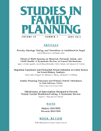
STUDIES IN FAMILY PLANNING
Connecting scholars for a healthier tomorrow in family planning.STUDIES IN FAMILY PLANNING, published by WILEY, is a renowned journal that serves as a critical resource in the fields of Demography and Social Sciences. With an impressive Q1 ranking in both categories, it is recognized for its high impact and influential contributions to the understanding of family planning dynamics, reproductive health, and population studies. The journal has published scholarly articles since 1970, reflecting its long-standing commitment to advancing knowledge and research in these important areas. Currently holding a rank of #27 out of 139 in Demography on Scopus, the journal's 2023 impact factor underscores its influential role in shaping policy and practice worldwide. Though it operates under a subscription model, it is readily accessible to members of the academic community, including researchers, professionals, and students dedicated to improving family planning systems and socio-demographic studies.

HERALD OF THE RUSSIAN ACADEMY OF SCIENCES
Empowering Researchers with Interdisciplinary PerspectivesHERALD OF THE RUSSIAN ACADEMY OF SCIENCES is a prominent interdisciplinary journal published by MAIK NAUKA/INTERPERIODICA/SPRINGER, specializing in the fields of cultural studies and political science. With an ISSN of 1019-3316 and an E-ISSN of 1555-6492, this journal features a robust platform for disseminating high-quality research that informs contemporary debates in social sciences. Over its converged years from 2005 to 2024, it has established itself as an influential source of scholarly articles, achieving a Q2 ranking in Cultural Studies and a Q3 ranking in Political Science and International Relations for 2023. The journal is recognized for its valuable contributions, with Scopus ranks reflecting a strong presence in both cultural studies (Rank #444/1304, 65th percentile) and political science (Rank #450/706, 36th percentile). Researchers, professionals, and students seeking to advance their understanding of the societal dynamics at play are encouraged to explore the insightful perspectives offered by this esteemed publication.

Journal of Population Ageing
Empowering Scholars to Address Ageing IssuesThe Journal of Population Ageing, published by SPRINGER INT PUBL AG, stands as a prominent platform for the exploration and dissemination of research within the fields of demography, geography, and sociology. With an ISSN of 1874-7884 and an E-ISSN of 1874-7876, this journal navigates the complexities of population ageing, a vital topic as societies worldwide confront the implications of an ageing demographic. The journal boasts impressive Scopus rankings, including the 30th rank in Demography and a 78th percentile in Sociology and Political Science, emphasizing its significant role in academic discourse. It is highly regarded in its Q2 category quartiles for Demography, Geography, Planning and Development, and Sociology and Political Science, showcasing its relevance and scholarly impact. Although not an open-access publication, the journal's carefully curated articles aim to inform and advance knowledge, making it an invaluable resource for researchers, professionals, and students invested in understanding the multifaceted challenges associated with an ageing population. With its comprehensive scope and commitment to quality, the Journal of Population Ageing continues to contribute meaningfully to the evolving conversation on demographic trends and their societal implications.

European Journal of Population-Revue Europeenne de Demographie
Advancing Demographic Insights for a Changing WorldWelcome to the European Journal of Population-Revue Europeenne de Demographie, a premier scholarly publication dedicated to advancing the field of demography. Published by Springer since 1985, this journal has established itself as a vital resource for researchers, professionals, and students interested in population studies, evidenced by its Q1 ranking in Demography for 2023 and a notable Scopus ranking within the top 20% of its category. With an ISSN of 0168-6577 and an E-ISSN of 1572-9885, the journal provides a platform for high-quality, peer-reviewed research, contributing to the understanding of population dynamics and demographic trends across Europe and beyond. Although currently not open access, the journal ensures broad mobility of knowledge through diverse access options, aspiring to bridge theoretical insights and practical applications crucial for policy-making and societal engagement. Join us in exploring the intricate tapestry of demographic data as we examine pressing issues such as migration, fertility, mortality, and population aging in an ever-evolving global context.

Revista Latinoamericana de Poblacion
Unveiling the Complexities of Latin American DemographicsRevista Latinoamericana de Poblacion is a distinguished open-access journal dedicated to the field of population studies, published by the Asociación Latinoamericana de Población. Since its inception in 2007, the journal has aimed to foster scholarly dialogue and disseminate critical research on demographic dynamics across Latin America. With an emphasis on diverse methodologies and interdisciplinary approaches, the journal serves as a platform for researchers, professionals, and students to engage with pressing issues such as migration, fertility, aging, and socio-economic factors influencing population trends. As an invaluable resource for the academic community, this journal not only promotes accessibility to vital research through its open-access model but also plays a crucial role in enhancing the understanding of demographic changes and their implications in the region. By focusing on the unique context of Latin America, Revista Latinoamericana de Poblacion facilitates a deeper insight into population phenomena that resonate globally.
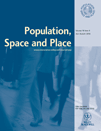
Population Space and Place
Advancing Insights in Demography and GeographyPopulation Space and Place is an esteemed academic journal published by WILEY, dedicated to advancing the fields of demography and geography, planning, and development. With an impressive 2023 impact factor and categorized in the top quartile (Q1) for both demography and geography, this journal serves as a vital platform for researchers, professionals, and students seeking to explore the spatial dimensions of population dynamics. Founded in 2004 and running through 2024, it has established itself as a significant contributor to scholarly discussions, evidenced by its high Scopus rankings, including rank #18 out of 139 in demography and #165 out of 821 in geography and planning. While the journal currently does not offer open access, it remains a key resource for those involved in academic research and policy formulation. With its focus on the interplay between population trends and spatial analytics, Population Space and Place is essential for anyone aiming to understand the complexities of population geography in a rapidly changing world.
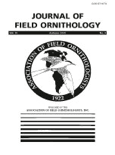
JOURNAL OF FIELD ORNITHOLOGY
Illuminating the Interactions of Birds and EcosystemsJOURNAL OF FIELD ORNITHOLOGY, published by the Resilience Alliance, is a premier academic journal dedicated to advancing knowledge in the fields of ornithology, ecology, and animal behavior. With an ISSN of 0273-8570 and a growing E-ISSN of 1557-9263, this journal has been a vital platform for researchers since its inception in 1996, continuing to publish cutting-edge studies up until 2024. The journal is recognized within the academic community, holding a Q2 ranking in Animal Science and Zoology and a Q3 ranking in Ecology, Evolution, Behavior and Systematics as of 2023. While the journal does not currently operate under an open access model, it remains a critical source for researchers, students, and professionals seeking to explore innovative research and discoveries in field ornithology. The diverse range of topics covered underscores its commitment to highlighting significant findings and fostering a deeper understanding of avian species and their ecosystems.
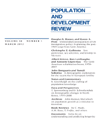
POPULATION AND DEVELOPMENT REVIEW
Exploring the Nexus of Population Dynamics and Development.Population and Development Review is a prestigious academic journal published by Wiley, recognized for its comprehensive exploration of the intersections between population dynamics and development processes. Since its inception in 1976, the journal has contributed significantly to the field, featuring rigorous peer-reviewed articles that address pressing issues in demography, development, and sociology, maintaining a commendable reputation with a Q1 ranking across multiple categories as of 2023. With an impact factor that reflects its influence—ranking in the 90th percentile in Sociology and Political Science, and 85th percentile in Development—this journal serves as a vital resource for researchers, policy-makers, and students alike. It is instrumental in fostering dialogue and disseminating knowledge that shapes and informs public policy and academic inquiry. Although not an open-access publication, it remains accessible through various academic institutions, ensuring that its valuable insights are available to a broad audience eager to engage with the complexities of population and development.
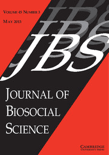
JOURNAL OF BIOSOCIAL SCIENCE
Advancing Insights into Health through a Biosocial LensJOURNAL OF BIOSOCIAL SCIENCE, published by Cambridge University Press, is a pivotal interdisciplinary journal dedicated to advancing our understanding of the complex interplay between biological and social factors in human health and society. With an ISSN of 0021-9320 and an E-ISSN of 1469-7599, this journal has been a cornerstone of scholarly communication since its inception in 1969, paving the way for innovative research until 2024 and beyond. The journal is ranked in the Q3 quartile in Public Health, Environmental and Occupational Health and Q2 in Social Sciences (miscellaneous), reflecting its significant impact in these fields. Its Scopus ranking further emphasizes its relevance, sitting at #79 out of 275 in General Social Sciences and #334 out of 665 in Public Health. Researchers, professionals, and students are encouraged to explore the journal's rich repository of articles that delve into critical biosocial issues, fostering a deeper understanding of how social structures influence health and well-being. Although not open access, the journal remains an essential resource for those committed to addressing contemporary health challenges through a biosocial lens.